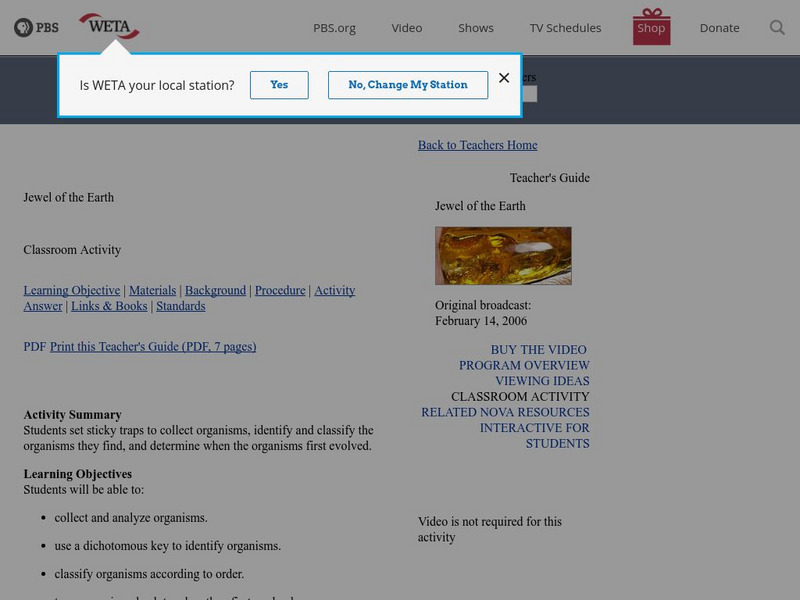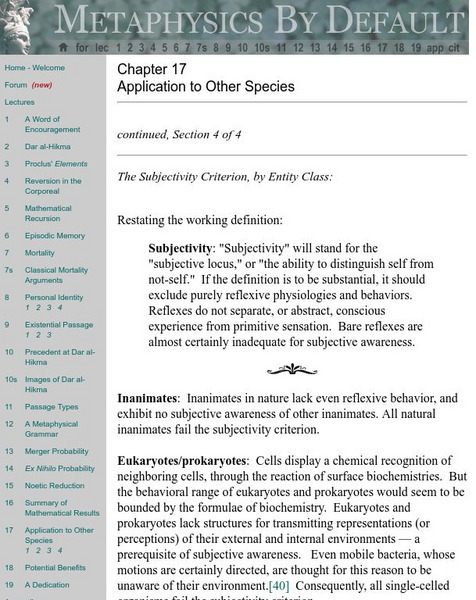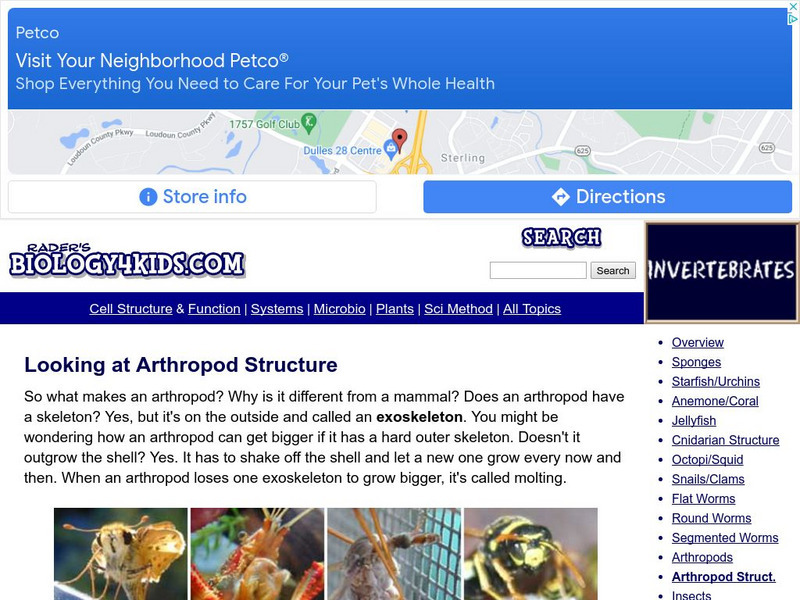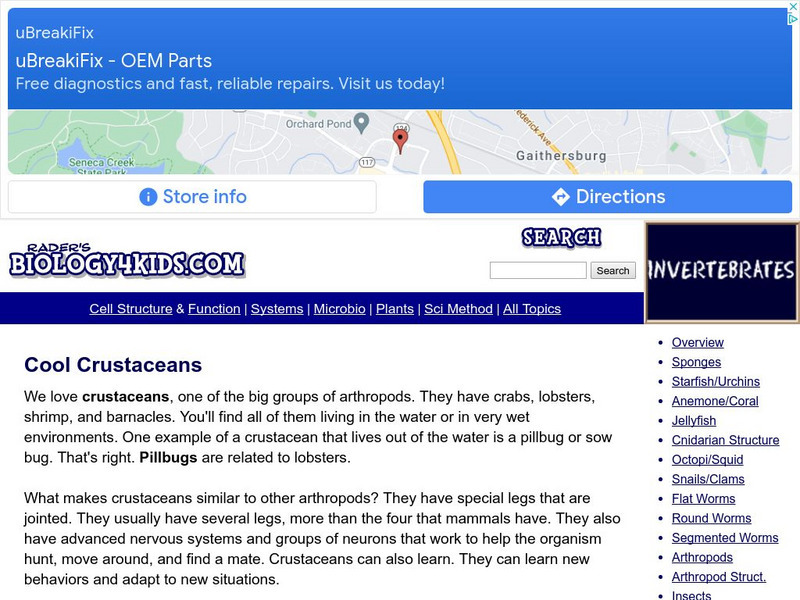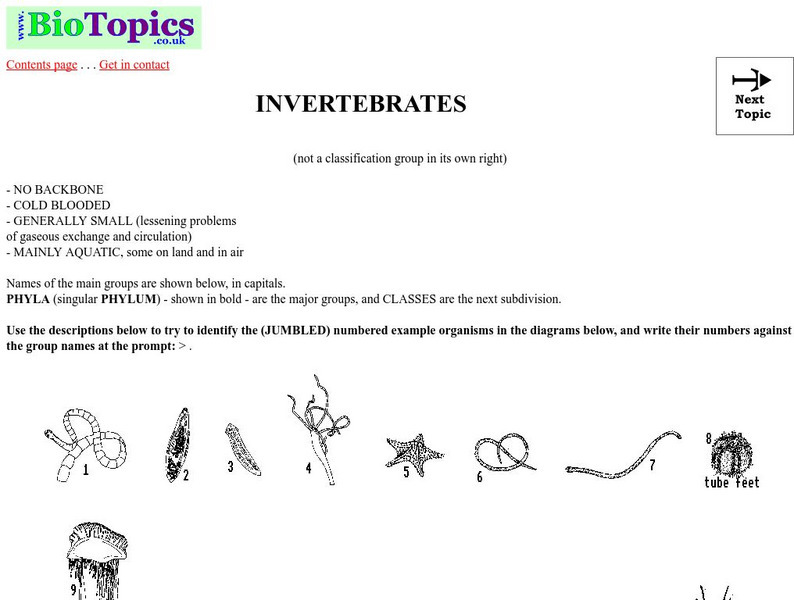Science Education Resource Center at Carleton College
Serc: Mn Step: Who Lives Here?: Investigating and Sorting Schoolyard Insects
For this investigation, students make a pit trap and collect bugs. They then record what they captured and sort the bugs. The data is combined to create a class graph.
PBS
Pbs Teachers: Jewel of the Earth
Collect and analyze organisms and use a dichotomous key to identify and classify the organisms. Research the evolutionary history of organisms.
Other
Walking Well: Arthropod Stings
This site has interesting information about stings from different arthropods like bees, wasps, hornets, yellow jackets, ants, caterpillars, spiders, ticks, centipedes, millipedes, and scorpions.
Middle School Science
Crayfish Dissection
In this lab experiment site, you will "Observe the external and internal anatomy of a crayfish, determine the sex of a crayfish using external anatomy, and collect statistical data on crayfish length and cheliped length."
San Diego Zoo Global
San Diego Zoo: Kids: Arthropods
Do you want to learn about what makes an insect? This page contains facts about the characteristics of arthropods as well as pictures of them.
Other
Wayne Stewart/social Insects
Discussion of insects that show awareness of others of their own species although their behavior is highly regimented and instinctive.
PBS
Pbs Teachers: Scientific American: Spiders! Song and Dance
Explore the diversity and prevalence of spiders around the world, and learn about jumping spiders, hunters that stalk their prey and pounce from a distance. Research the types and population density of spiders that live around you.
PBS
Pbs Teachers: Scientific American: Spiders! Spin, Spin, Spin
Investigate the use of computers to simulate spider behaviors to learn more about how and why spiders build webs. Build a model of a web to compare your eyesight and dexterity to a spider's, then compare the elasticity and strength of...
Regents of the University of Michigan
Animal Diversity Web: Phylum Arthropoda
This general overview of the arthropod phylum, which includes insects and arachnids, looks at such topics as body symmetry, appendages, movement, respiratory and nervous systems, and reproduction.
Biology 4 kids
Biology4 Kids: Arthropods Invertibrate Powerhouses
The majority of animal species are arthropods. Take a look at the structure of arthropods and the four main types.
Biology 4 kids
Biology4 Kids: Looking at Arthropod Structure
An overview of the structure and development of arthropods.
Biology 4 kids
Biology4 Kids: Cool Crustaceans
What crustacean lives outside of water? Find out while perusing this text about crustaceans, a large category of arthropods.
Biology 4 kids
Biology4 Kids: Spiders and Scorpions More Arthropods
Spiders, scorpions, and horseshoe crabs are featured as arthropods.
Songs for Teaching
No Backbone Beat
Learn your invertebrates with this great rap. Your students will be walking through the halls singing this rap, when you begin your invertebrate unit with it. It covers protozoan, metazoan, arthropods, and more.
Ducksters
Ducksters: Bugs (Insects and Arachnids)
What is an instect? Kids learn about where and how bugs live. What is an arachnid?
BiologyWise
Biology Wise: Characteristics of Arthropods
Describes general characteristics of Arthropoda and features of the different animal classes within this phylum.
BiologyWise
Biology Wise: Types of Parasites
Different types of parasites that infect humans, dogs, and cats are described.
Science4Fun
Science4 Fun: Grasshopper
Learn about the appearance, diet, habitat, conservation status, and other fun facts about this jumping insect.
Science4Fun
Science4 Fun: Scorpion
Learn about the appearance, diet, habitat, conservation status, and other fun facts about this poisonous animal.
Saint Louis Zoo
Saint Louis Zoo: Black Widow
Discover fun facts and learn about the habitat, behavior, and appearance of the black widow.
Saint Louis Zoo
Saint Louis Zoo: Missouri Millipede
Discover fun facts and learn about the habitat, behavior, appearance, of the Missouri millipede.



